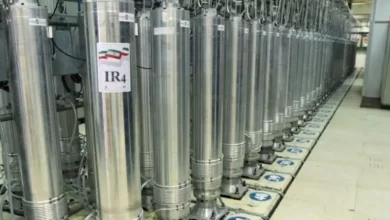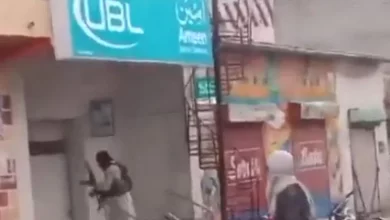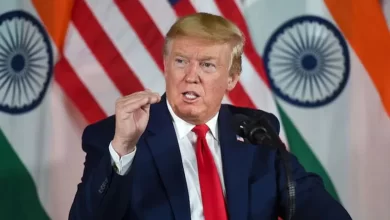Israel-Palestine live news: Israel strikes Gaza and Lebanon


- Israel’s military has launched air attacks on southern Lebanon and the Gaza Strip following a spate of reported rocket attacks on the country.
- The escalation in tensions comes after Israeli forces stormed the Al-Aqsa Mosque in occupied East Jerusalem on successive days this week, firing stun grenades and attacking Palestinians as they gathered for Ramadan prayers.
- Lebanese army works to dismantle rocket launchers
- A Lebanese military unit has located a rocket launcher near the town of Marjayoun in southern Lebanon, which lies about six kilometers north of the Israeli town of Metula.
- The Lebanese army said over Twitter that its forces were working to dismantle the launcher, which contained a number of unlaunched missiles.
- Israel’s violence is open terrorism — stop calling it ‘clashes’
- Here we go again. The state of Israel is committing unchecked barbarism against Palestinians and the Western corporate media has decided it all comes down to “clashes”.
- The latest round of so-called “clashes” – sparked when Israeli police decided to mark the Muslim holy month of Ramadan by repeatedly attacking Palestinian worshippers at Jerusalem’s Al-Aqsa Mosque – has produced predictably disproportionate casualties.

Israeli police are deployed at the Al-Aqsa Mosque compound in the Old City of Jerusalem
Israeli security experts say Hezbollah must have agreed to attacks from Lebanon
Although Israel has blamed Hamas for Thursday’s attack, which took place as Hamas head Ismail Haniyeh was visiting Lebanon, security experts said Hezbollah, the powerful Shia group which helps Israel’s main enemy Iran project its power across the region, must have given its permission.
“It’s not Hezbollah shooting, but it’s hard to believe that Hezbollah didn’t know about it,” Tamir Hayman, a former head of Israeli military intelligence, said
Israeli operation over for now, says Israeli military
An Israeli military spokesman has said the Israeli operation was over for the moment.
“Nobody wants an escalation right now,” he told reporters.
“Quiet will be answered with quiet, at this stage I think, at least in the coming hours,” he added.

Israeli military says will not allow Hamas to operate from Lebanon
The Israeli Defense Forces (IDF) has said it would not allow Hamas, the Palestinian armed group ruling the Gaza Strip, to attack from Lebanon.
“The IDF will not allow the Hamas terrorist organisation to operate from within Lebanon,” the IDF said in a statement.
It added that it holds the state of Lebanon responsible any attacks emanating from its territory.
Israeli strikes on Lebanon risk drawing Hezbollah response
Israeli strikes in Lebanon risk drawing Lebanon’s Hezbollah movement into the fighting, which could lead to war.
Both Israel and Hezbollah have avoided an all-out conflict since a 34-day war in 2006 ended in a draw.
The Iran-backed group, armed with thousands of rockets and missiles, holds sway over much of southern Lebanon and is viewed by Israel as a bitter foe.
‘We are only defending ourselves’: Hamas member in Gaza
A Hamas member has told Al Jazeera that people in Gaza have “no place to hide” and rocket fire was a way for the enclave to defend itself from Israel.
Speaking on Friday from Gaza, Basem Naim, said residents were scared but had nowhere to go.
“We have no place to hide or take shelter,” he said.
“We are only defending ourselves. It has always been a response to continued Israeli aggression on a daily basis.”
The tiny Gaza Strip is home to two million Palestinians and came under Israeli occupation, along with the West Bank and East Jerusalem, after the 1967 Arab-Israeli War.
Residents of the self-governed enclave have been under an Israeli air and sea blockade since 2007.


Strikes in Lebanon hit ‘open spaces’: AJ correspondent
The targets hit by Israeli attacks in southern Lebanon were “open spaces” suggesting Israel may be trying to avoid an escalation, according to Zeina Khodr.
She says that while a village identified as the origin of Thursday’s rocket fire was targeted, the Israeli missiles fell on “open spaces”.
“This really suggests Israel would not have wanted an escalation,” says Khodr, who is in Beirut.
Israel has said it was focusing on Hamas targets in its Friday raids.
Hamas and Lebanon’s Iran-backed Hezbollah movement have close ties and Hamas leader Ismail Haniyeh is currently in the country on a private visit.
What’s been happening at Al-Aqsa Mosque?
The latest surge in tension comes after violence inside the Al-Aqsa Mosque in occupied East Jerusalem.
Israeli riot police stormed the mosque, Islam’s third-holiest shrine, as people were at prayer on successive occasions earlier this week, deploying stun grenades and tear gas.
The 14-hectare (35-acre) compound houses the al-Qibli Mosque and the Dome of the Rock, and is built on the Temple of the Mount, one of Judaism’s most sacred sites.
Confrontations at Al-Aqsa have sparked deadly cross-border wars between Israel and Gaza’s Hamas rulers in the past – most recently in 2021.
Hamas condemns Israeli air strikes on Lebanon
Hamas has just issued a statement in response to the Israeli air attacks in southern Lebanon.
“We strongly condemn the blatant Zionist aggression against Lebanon in the vicinity of Tyre at dawn today,” the statement said.
UN mission in Lebanon warns of ‘serious escalation’
The United Nations Interim Force in Lebanon (UNIFIL), the UN’s peacekeeping mission in the country, is urging restraint.
“Both sides (Lebanon and Israel) have said they do not want a war,” UNIFIL said in a statement, adding that mission head Major General Aroldo Lazaro was speaking to authorities on both sides of the border.
“The actions over the past day are dangerous and risk a serious escalation,” UNIFIL said.
Lebanon PM condemns rocket fire, ‘rejects any military escalation’
Lebanon’s caretaker Prime Minister Najib Mikati has condemned the firing of rockets from Lebanon.
Al Jazeera’s Zeina Khodr says the prime minister said the army and United Nations peacekeepers were investigating who was behind the launches and trying to find the perpetrators.
The government “categorically rejects any military escalation”, Mikati added, as well as the use of Lebanon to stage acts that threaten stability.







